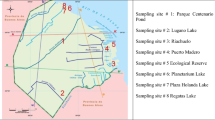Abstract
Environmental quality for environmental health has been examined visually by describing general conditions and drinking water supply, sanitation and solid waste treatment conditions and practices in six South-East Asian villages with a dense population. The environmental review was supplemented by discussions with local people and political and administrative decision makers. Some drinking water analyses were done in order to show the water quality to the local people. The quality of the general conditions and the conditions and practices of drinking water supply, excreta disposal and solid waste treatment practices have been graded with the grading system presented below. The grading could be done in 1 or 2 days in each area by two persons, of which one was an environmental scientist and the other a social scientist, who also knew the local culture and worked as a translator.
Similar content being viewed by others
References
AtKisson A., Hatcher R.L. 2001, The compass index of sustainability: prototype for a comprehensive sustainability information system Journal of Environmental Assessment Policy and Management 3: 509–532
Bonaiuto M., Fornara F., Bonnes M. 2003, Indexes of perceived residential environment quality and neighbourhood attachment in urban environments: a confirmation study on the city of Rome Landscape and Urban Planning 65:41–52
Chokor B.A. 1989, The evaluation of environmental quality for planning in the Third World. A multidimensional scaling approach and a case study of Ibadan, Nigeria Third World Review 11: 189–210
Danis-Lozano R., Rodriguez M.H., Hernandez-Avila M. 2002, Gender-related family head schooling and Aedes aegypti larval breeding risk in southern Mexico Salud Publica Mex 44(3): 237–242
Downs T.J. 2001, Sustainable health risk and the role of cross-disciplinary professionals in developing countries: Mexican experience, Environment Development and Sustainability 3:61–81
Eyong C.T., Mbuagbo O.T. 2002, Assessment of the hygiene and sanitation campaign in Cameroon Environment, Development and Sustainability 4: 391–402
Fehr M., Sousa K.A., Pereira A.F.N., Pelizer L.C. 2004, Proposal of indicators to assess urban sustainability in Brazil Environment, Development and Sustainability 6: 355–366
Ferrarini A., Bodini A., Becchi M. 2001, Environmental quality and sustainability in the multi-criteria analysis to assess and compare municipal performance Journal of Environmental Management 63: 117–131
Georgina: 2001, `Traveller’s Companion to India’, P. Srinivasan (ed.), TTK Healthcare Limited Printing Division. Chennai, India
Halvorson S.J. 2004, Women’s management of the household environment: responding to childhood diarrhoea in the Northern Areas, Pakistan Health & Place 10: 43–58
Heinonen-Tanski, H. and Wijk-Sijbesma, C. van: 2005, `Human excreta for plant production’, Bioresource Technology 96, 403–411
Kurttio, P.: 1999, Arsenic and fluoride in well waters – Exposure and heath effects, Public Health Institute (A12/1999), Ph. D. dissertation University of Kuopio
Stedman, L.: 2005, Disasters: delivering a strategic response. Portable preference Water 21, Feb 2005, 15
Thomas E.P., Seager J.R., Mathee A. 2002, Environmental health challenges in South Africa: policy lessons from case studies Health & Place 8:251–261
Wijk-Sijbesma, C. van: 1998, Gender in Water Resources Management, Water Supply and Sanitation: Roles and Realities Revisited, IRC, The Hague The Netherlands
Acknowledgements
Warm thanks are given to many local people for the very valuable discussions as well as their keen interest to improve their own and global environment. Also special thanks all the co-workers in India, Sri Lanka and Bangladesh, who have helped with journeys and with interpreting the languages and increasing the cultural understanding. This work is part of an action-research project Women, Wellbeing, Work, Waste and Sanitation (4Ws) (contract ICA4-CT-2002-10013) financed by the EU. Dr. Ewen McDonald has corrected the English text.
Author information
Authors and Affiliations
Corresponding author
Rights and permissions
About this article
Cite this article
Heinonen-Tanski, H., SNEL, M., van Wijk-Sijbesma, C. et al. Assessing of Environmental Quality in Six Areas in India, Sri Lanka and Bangladesh. Environ Dev Sustain 9, 355–368 (2007). https://doi.org/10.1007/s10668-006-9026-7
Received:
Accepted:
Published:
Issue Date:
DOI: https://doi.org/10.1007/s10668-006-9026-7




